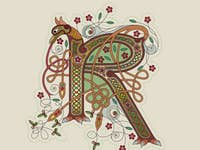Communication
and Books
Methods of communication during the medieval period were very limited.
Without the use of television, telephone, radio, Internet or the postal service, correspondence took place in the form of letters delivered by private messengers. Letters were written on parchment (pieces of dried animal skin) with the use of ink and quill pen.

Books
Books were very expensive in the Middle Ages, as each was written and illustrated by hand. A book consisted of a series of bound parchment leaves. Before the invention of the printing press, it took a team of scribes, illuminators and bookbinders a very long time to make a single book.

Book illumination was a very important art form during this time period, but faded in the 16th century with the invention of the printing press. Books were written primarily for the literate classes and the people wealthy enough to afford them: the nobility, merchant upper class and the church. The Book of Kells is a famous example of an illuminated manuscript that has survived to this day.
There are too many varieties of calligraphic and illumination styles to list. The reason for this is that calligraphy varies with each culture and with the time period in which it was used.
Illuminated manuscripts of the Middle Ages portrayed the meaning of the written words through illustration. Artists used shape, color and design to define the meaning behind the text. Usually the artists changed plant, animal and human images into abstract forms. Illuminated manuscripts are important to the history of art, but also to the history of books themselves. Books today are a direct descendent of illuminated manuscripts.
Medieval to Modern
Modern handwriting is based on the italic style of writing. Italic was designed to be written quickly.